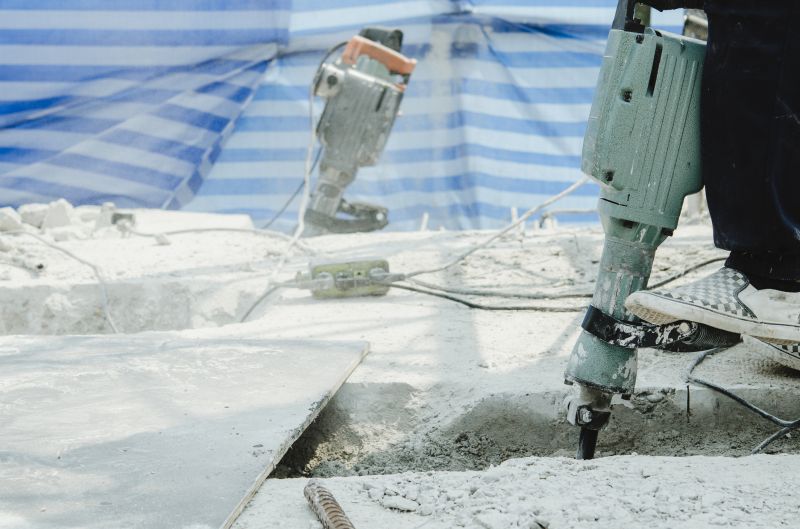Leading Choices For Concrete Slabjacking Tools And Supplies
Equip yourself with the most trusted products designed to simplify and improve your concrete leveling projects.
 Concrete slabjackings are essential solutions for addressing uneven or sunken concrete surfaces, which can develop over time due to soil movement, erosion, or improper installation. Selecting the right products for slabjacking involves understanding various methods and materials designed to lift and stabilize concrete slabs effectively. These products typically include specialized pumps, foam injection systems, grout mixes, and supporting accessories that enable precise application and durable results.
Concrete slabjackings are essential solutions for addressing uneven or sunken concrete surfaces, which can develop over time due to soil movement, erosion, or improper installation. Selecting the right products for slabjacking involves understanding various methods and materials designed to lift and stabilize concrete slabs effectively. These products typically include specialized pumps, foam injection systems, grout mixes, and supporting accessories that enable precise application and durable results.
Top Overall Option
Polyurethane Foam Injection System
A versatile and widely used method for slabjacking, polyurethane foam injection systems provide quick expansion and strong adhesion to lift and stabilize sunken concrete. They are suitable for a variety of soil conditions and offer precise control during application, making them a popular choice for both professional contractors and experienced DIYers.
Types of Products For Concrete Slabjackings
Polyurethane Foam Kits
Pre-mixed foam kits designed for easy application in residential or small commercial projects, offering quick setting and minimal cleanup.
Polymer Grout Mixes
Customizable grout mixes that provide strong bonding and support for larger slab repairs, often used in commercial settings.
Hydraulic Pump Systems
Heavy-duty pumps that deliver precise pressure for injecting grout or foam beneath slabs, ideal for large-scale projects.
Injection Ports and Nozzles
Specialized fittings used to deliver materials into the substrate accurately and efficiently during slabjacking procedures.
Mixing and Dispensing Equipment
Tools designed to prepare and apply grout or foam mixes with consistency and control, enhancing application quality.
Self-Leveling Fillers
Lightweight materials that fill minor voids and help level uneven slabs, often used as a supplementary step.
Underpinning Supports
Supports and braces used during slabjacking to maintain stability and alignment throughout the process.
Soil Stabilization Products
Materials that improve soil conditions before slabjacking, ensuring better adhesion and long-term stability.
Crack Repair Sealants
Sealants used to address surface cracks before or after slabjacking to prevent water infiltration and further damage.
Portable Injection Equipment
Compact and mobile tools suitable for small-scale or DIY projects, offering ease of transport and operation.
High-Pressure Grout Pumps
Equipment capable of delivering grout at high pressure for challenging soil conditions or large voids.
Epoxy Resins for Concrete Repair
Resins used to fill cracks and bond concrete surfaces prior to slabjacking, enhancing overall stability.
Vibration and Compaction Tools
Devices that assist in consolidating soil and grout mixes, ensuring uniform distribution and strength.
Popular Choices
Popular for their ease of use and quick expansion properties, suitable for various slabjacking tasks.
Trusted for their power and precision in larger projects, facilitating effective grout or foam delivery.
Commonly used to seal surface cracks before or after slabjacking to prevent water ingress.
Often chosen for minor repairs to quickly level uneven surfaces and fill small voids.
Essential accessories that facilitate precise material delivery beneath slabs.
Ideal for small projects, offering mobility and straightforward operation for grout injection.
Used to improve ground conditions prior to slabjacking, enhancing long-term stability.
Popular for ensuring consistent mixes and efficient application during slabjacking.
Frequently selected for crack repairs that support the slabjacking process.
Commonly used to ensure proper consolidation of grout or foam fills.
The process generally involves injecting materials beneath the affected slab to lift it back into its proper position. Different products cater to specific needs, whether for small residential repairs or larger commercial projects. Proper selection ensures that the materials used are compatible with existing concrete, provide sufficient load-bearing capacity, and facilitate easy application. Safety considerations and ease of use are also important factors when choosing products for slabjacking projects.
In addition to the core injection materials, various tools and accessories such as hoses, mixing equipment, and stabilization supports are available to optimize the process. These products are designed to work with a range of soil conditions and concrete types, providing versatility for different repair scenarios. Understanding the specific requirements of each project can help in selecting the most suitable products, ensuring a stable and level concrete surface that minimizes future issues.
Overall, the market offers a broad spectrum of products tailored to different slabjacking needs. Whether tackling minor repairs or large-scale stabilization, choosing the right combination of materials and tools can significantly impact the longevity and stability of the repaired concrete. Proper research and understanding of product specifications are crucial for successful slabjacking outcomes.
Key Buying Considerations
- Compatibility of the product with existing concrete and soil conditions
- Type of material (foam, grout, epoxy) best suited for the specific repair needs
- Ease of application, especially if used by DIY homeowners
- Application equipment requirements and whether they are included or need to be purchased separately
- The pressure and flow control features of pumps and injection systems
- Durability and strength of the injected material for long-term stability
- Curing time and workability window for the materials used
- Safety features and ease of handling during application
- Size and portability of equipment for project scale and location
- Cost-effectiveness and availability of replacement parts or consumables
- Brand reputation and user reviews for reliability and performance
- Availability of technical support or instructional resources
- Environmental considerations, such as VOC emissions (if relevant)
- Compatibility with different soil and slab conditions
- Additional accessories needed for complete application, such as nozzles or mixing tools
